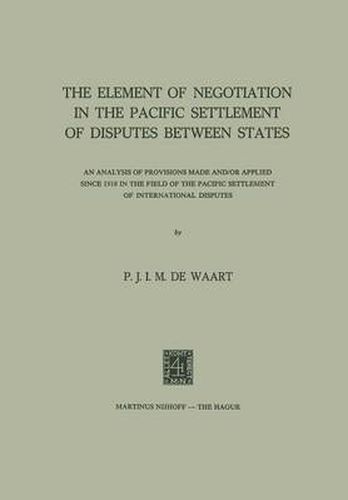Readings Newsletter
Become a Readings Member to make your shopping experience even easier.
Sign in or sign up for free!
You’re not far away from qualifying for FREE standard shipping within Australia
You’ve qualified for FREE standard shipping within Australia
The cart is loading…






This title is printed to order. This book may have been self-published. If so, we cannot guarantee the quality of the content. In the main most books will have gone through the editing process however some may not. We therefore suggest that you be aware of this before ordering this book. If in doubt check either the author or publisher’s details as we are unable to accept any returns unless they are faulty. Please contact us if you have any questions.
The system of the pacific settlement of disputes contained in the United Nations Charter - confirmed in 1970 in the Declaration on Principles of International Law concerning Friendly Relations and Co-operation among States - is based on agreement between the parties on both the method to be applied and the acceptance of its results. From the juridical point of view states are free in this system to establish in advance their choice of the appli cation of one or more methods to a dispute and their willingness to accept the result in respect of all or certain groups of disputes or only to determine their choice when a dispute arises. The functioning of the International Court must be regarded in this light. The practice of pacific settlement shows that there is not too great a distance between the standpoints of the Soviet countries, who emphasise direct negotiation as the starting point in settling disputes, and that of the Western countries, who lay particular stress on judicial settlement as such, because the Western countries usually make the application of arbitration and judicial settlement to a specific dispute dependent on the cooperation of all parties, in obtaining which negotiations are essential.
$9.00 standard shipping within Australia
FREE standard shipping within Australia for orders over $100.00
Express & International shipping calculated at checkout
Stock availability can be subject to change without notice. We recommend calling the shop or contacting our online team to check availability of low stock items. Please see our Shopping Online page for more details.
This title is printed to order. This book may have been self-published. If so, we cannot guarantee the quality of the content. In the main most books will have gone through the editing process however some may not. We therefore suggest that you be aware of this before ordering this book. If in doubt check either the author or publisher’s details as we are unable to accept any returns unless they are faulty. Please contact us if you have any questions.
The system of the pacific settlement of disputes contained in the United Nations Charter - confirmed in 1970 in the Declaration on Principles of International Law concerning Friendly Relations and Co-operation among States - is based on agreement between the parties on both the method to be applied and the acceptance of its results. From the juridical point of view states are free in this system to establish in advance their choice of the appli cation of one or more methods to a dispute and their willingness to accept the result in respect of all or certain groups of disputes or only to determine their choice when a dispute arises. The functioning of the International Court must be regarded in this light. The practice of pacific settlement shows that there is not too great a distance between the standpoints of the Soviet countries, who emphasise direct negotiation as the starting point in settling disputes, and that of the Western countries, who lay particular stress on judicial settlement as such, because the Western countries usually make the application of arbitration and judicial settlement to a specific dispute dependent on the cooperation of all parties, in obtaining which negotiations are essential.